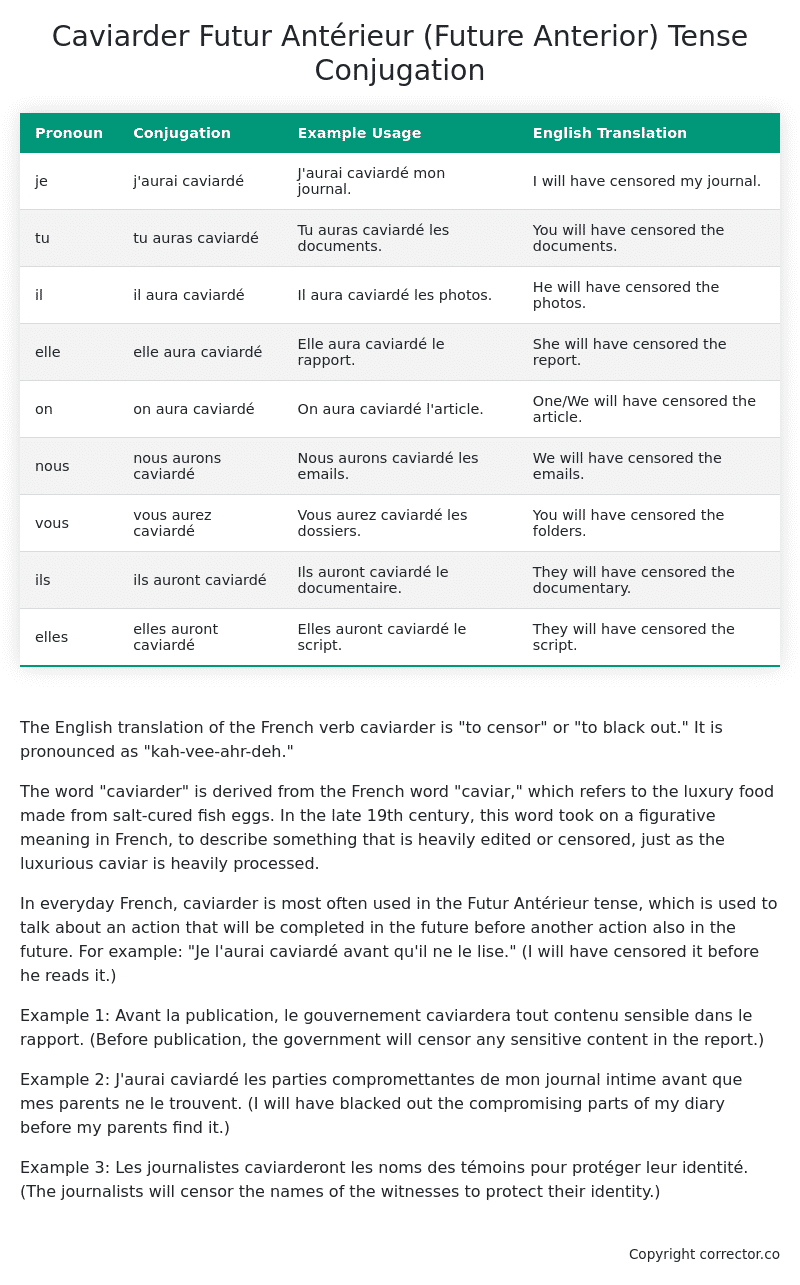Futur Antérieur (Future Anterior) Tense Conjugation of the French Verb caviarder
Introduction to the verb caviarder
The English translation of the French verb caviarder is “to censor” or “to black out.” It is pronounced as “kah-vee-ahr-deh.”
The word “caviarder” is derived from the French word “caviar,” which refers to the luxury food made from salt-cured fish eggs. In the late 19th century, this word took on a figurative meaning in French, to describe something that is heavily edited or censored, just as the luxurious caviar is heavily processed.
In everyday French, caviarder is most often used in the Futur Antérieur tense, which is used to talk about an action that will be completed in the future before another action also in the future. For example: “Je l’aurai caviardé avant qu’il ne le lise.” (I will have censored it before he reads it.)
Example 1: Avant la publication, le gouvernement caviardera tout contenu sensible dans le rapport. (Before publication, the government will censor any sensitive content in the report.)
Example 2: J’aurai caviardé les parties compromettantes de mon journal intime avant que mes parents ne le trouvent. (I will have blacked out the compromising parts of my diary before my parents find it.)
Example 3: Les journalistes caviarderont les noms des témoins pour protéger leur identité. (The journalists will censor the names of the witnesses to protect their identity.)
Table of the Futur Antérieur (Future Anterior) Tense Conjugation of caviarder
| Pronoun | Conjugation | Example Usage | English Translation |
|---|---|---|---|
| je | j’aurai caviardé | J’aurai caviardé mon journal. | I will have censored my journal. |
| tu | tu auras caviardé | Tu auras caviardé les documents. | You will have censored the documents. |
| il | il aura caviardé | Il aura caviardé les photos. | He will have censored the photos. |
| elle | elle aura caviardé | Elle aura caviardé le rapport. | She will have censored the report. |
| on | on aura caviardé | On aura caviardé l’article. | One/We will have censored the article. |
| nous | nous aurons caviardé | Nous aurons caviardé les emails. | We will have censored the emails. |
| vous | vous aurez caviardé | Vous aurez caviardé les dossiers. | You will have censored the folders. |
| ils | ils auront caviardé | Ils auront caviardé le documentaire. | They will have censored the documentary. |
| elles | elles auront caviardé | Elles auront caviardé le script. | They will have censored the script. |
Other Conjugations for Caviarder.
Le Present (Present Tense) Conjugation of the French Verb caviarder
Imparfait (Imperfect) Tense Conjugation of the French Verb caviarder
Passé Simple (Simple Past) Tense Conjugation of the French Verb caviarder
Passé Composé (Present Perfect) Tense Conjugation of the French Verb caviarder
Futur Simple (Simple Future) Tense Conjugation of the French Verb caviarder
Futur Proche (Near Future) Tense Conjugation of the French Verb caviarder
Plus-que-parfait (Pluperfect) Tense Conjugation of the French Verb caviarder
Passé Antérieur (Past Anterior) Tense Conjugation of the French Verb caviarder
Futur Antérieur (Future Anterior) Tense Conjugation of the French Verb caviarder (this article)
Subjonctif Présent (Subjunctive Present) Tense Conjugation of the French Verb caviarder
Subjonctif Passé (Subjunctive Past) Tense Conjugation of the French Verb caviarder
Subjonctif Imparfait (Subjunctive Imperfect) Tense Conjugation of the French Verb caviarder
Subjonctif Plus-que-parfait (Subjunctive Pluperfect) Tense Conjugation of the French Verb caviarder
Conditionnel Présent (Conditional Present) Tense Conjugation of the French Verb caviarder
Conditionnel Passé (Conditional Past) Tense Conjugation of the French Verb caviarder
L’impératif Présent (Imperative Present) Tense Conjugation of the French Verb caviarder
L’infinitif Présent (Infinitive Present) Tense Conjugation of the French Verb caviarder
Struggling with French verbs or the language in general? Why not use our free French Grammar Checker – no registration required!
Get a FREE Download Study Sheet of this Conjugation 🔥
Simply right click the image below, click “save image” and get your free reference for the caviarder Futur Antérieur tense conjugation!

Caviarder – About the French Futur Antérieur (Future Anterior) Tense
Construction
Common Everyday Usage Patterns
Interactions with Other Tenses
For example
Summary
I hope you enjoyed this article on the verb caviarder. Still in a learning mood? Check out another TOTALLY random French verb conjugation!


